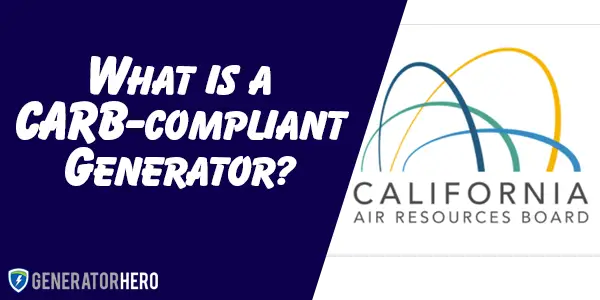CARB-compliant simply means that your equipment meets the current emission standards set by CARB and/or the EPA.
Therefore, emissions that are associated with small power equipment engines, like the ones used to operate generators, fall under its guidelines. CARB-compliant products have engines that meet more stringent air quality standards. This makes a CARB-compliant engine more attractive to most people.
Table of Contents
- What’s the difference between CARB and the EPA?
- Why is CARB-compliance important?
- What is the difference between CARB-compliant and non-CARB-compliant?
- What other states are CARB-compliant?
- What if my generator is non-CARB-compliant?
- Is a CARB-compliant generator better?
- What are the best CARB-compliant generators?
What’s the difference between CARB and the EPA?
Although most of the country follows the guidelines of the Environmental Protection Agency (EPA), CARB-compliance is usually stricter. CARB-compliance is mandatory in the state of California while EPA compliance covers all the states of the U.S. The two bodies work to regulate the effects on the environment.
EPA enforcement powers include fines, sanctions, and other measures. The agency also works with industries and all levels of government in a wide range of voluntary pollution prevention programs and energy conservation efforts.
Why is CARB-compliance important?
When an engine burns fossil fuels (gas, diesel, or propane) to convert into energy through the internal combustion process, undesirable emissions, such as toxins and particulates, occur. Over time, the emissions harm the air quality, which in turn harms the quality of life. Since the 1990s, regulations were expanded from factories and vehicles to include smaller engines, like those found on generators.
What is the difference between CARB-compliant and non-CARB-compliant?
Non-CARB-compliant engines have not gone through the process of certification. They may be on par with some of the CARB regulations, but the manufacturer has not gone through the steps to become CARB-compliant. If the compliance is required by your state, it would be best to buy a CARB-compliant generator.
What other states are CARB-compliant?
Several states have adopted the California standards. These include Colorado, Connecticut, Delaware, Maine, Maryland, Massachusetts, New Jersey, New Mexico (2011 model year and newer), New York, Oregon, Pennsylvania, Rhode Island, Vermont, and Washington (2009 model year and newer), as well as the District of Columbia.
What if my generator is non-CARB-compliant?
Non-CARB-compliant generators can be used in California but cannot be sold. If you live in any of the states that have adopted CARB-compliance, you should check with the local/state regulations. When you are about to purchase a generator, it will be your requirement to get a CARB-compliant one.
Is a CARB-compliant generator better?
If you are using a CARB-compliant portable generator you may have noticed that it runs more efficiently and cleaner than generators that are not CARB-compliant. Your generator produces less harmful emissions, toxins, and particulates and results in a cleaner and safer air quality.
What are the best CARB-compliant generators?


